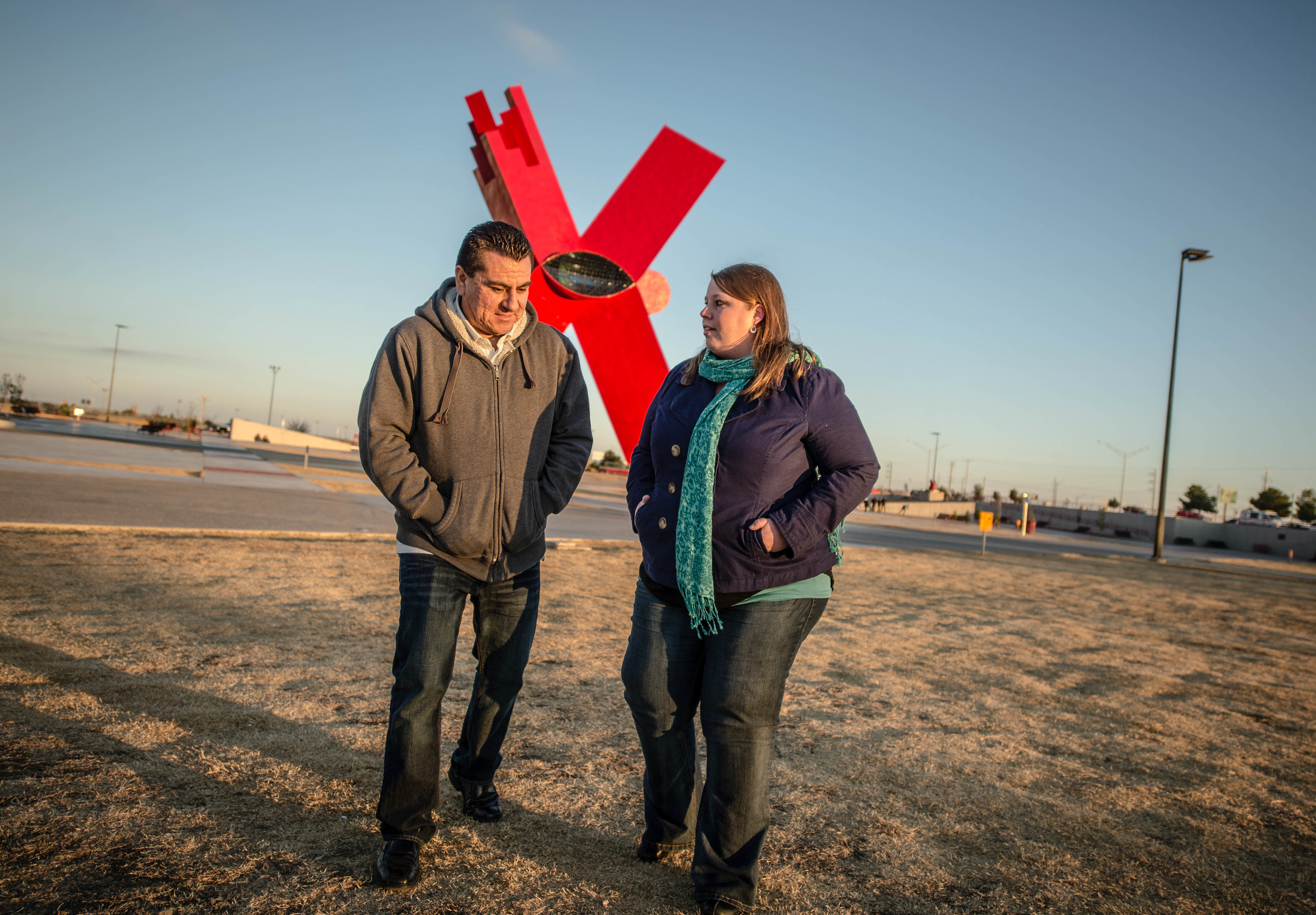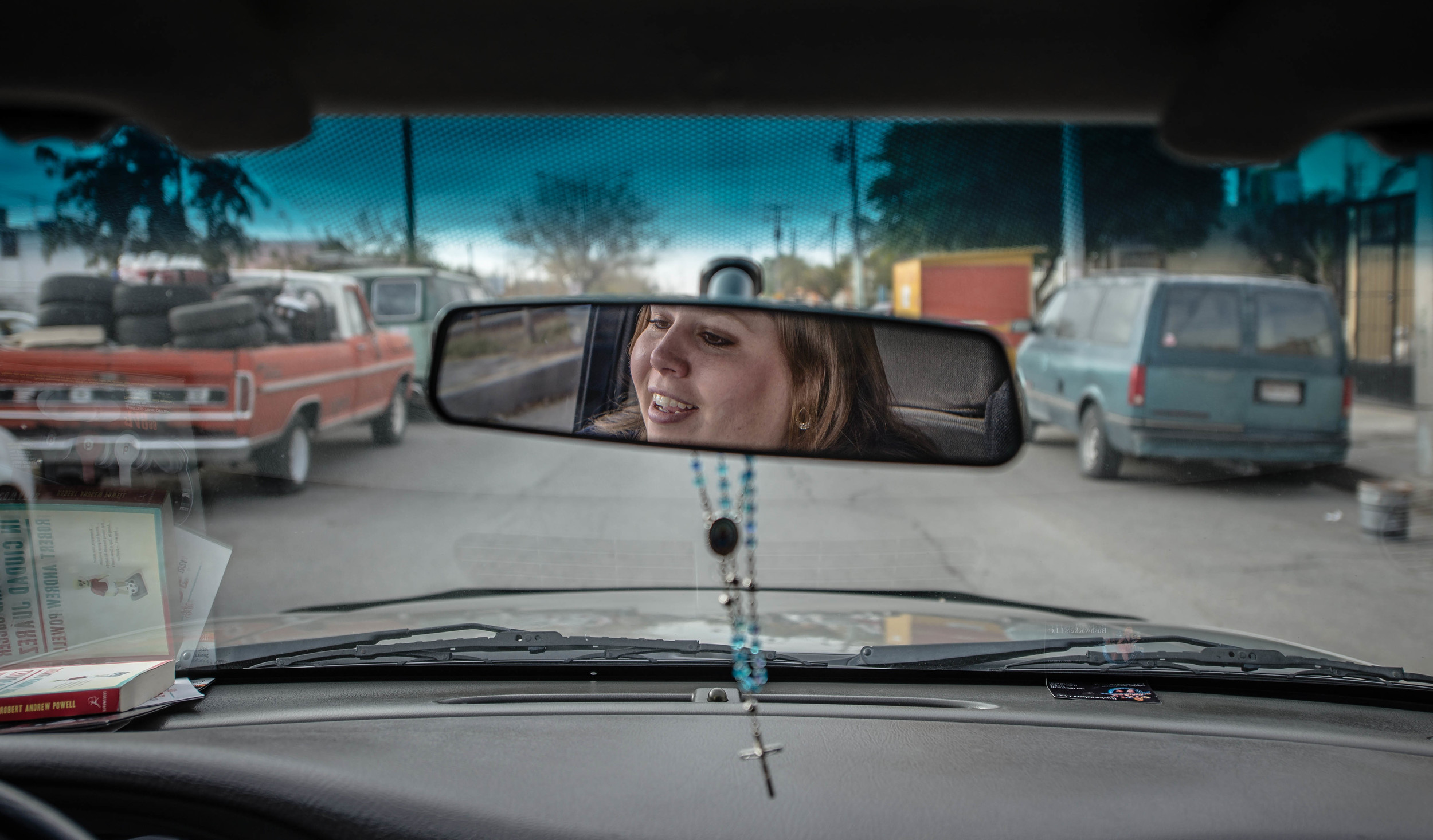She’s American, he’s Mexican: They’re caught in limbo
Raymundo and Emily Cruz walk on the esplanade under the X sculpture by the Mexican artist known as Sebastian, which Emily in her blog has called a symbol of Ciudad Juárez’s renewal, “the promise of a new beginning.” (Roberto E. Rosales/Albuquerque Journal)
CIUDAD JUÃREZ – “I cried myself to sleep that night thinking I had made the biggest mistake in the world. I cried because I felt stupid, homesick, spoiled, lost, sheltered, weak, and most of all scared (expletive) of what was to come.”
Emily Bonderer Cruz left her home in Arizona to start a new life in this border city three years ago with her husband, Raymundo, even as thousands of people were fleeing this same city at the height of a violent drug war.
The Cruzes found themselves trapped in a little-known purgatory of the U.S. immigration system, along with an unknown number of other couples advocates say could number in the thousands or tens of thousands. She is a U.S. citizen; he is Mexican. When the two met in 2005, Raymundo was working without legal documents and had crossed into the United States illegally twice – landing him with a lifetime ban from the country that, despite their later marriage, made him ineligible to apply for a pardon for a decade. The 10-year clock would only start ticking once he left the country.
So, the couple packed their possessions and, in 2010, drove through New Mexico into Texas and over the border to wait it out.
And blog about it.
Sharp-tongued and witty, Emily curses liberally in English and Spanish, and launched a blog that would eventually draw media attention and become a point of reference for other couples living in Ciudad Juárez and other border towns under similar circumstances: The Real Housewife of Ciudad Juárez. She vents, she marvels, she agonizes, but she also makes the best of what many have described as a sad and bitter situation.
“I could be pissed off all the time and angry at my country all the time, and run around Juárez with a frown on my face and be angry at the world,” she said one recent afternoon in an interview at her home. “Ideally, I didn’t want to be here. But life isn’t … . You don’t always get what you want.”
She ended her first blog post in August 2010, about the night she cried herself to sleep, with a repetition like a mantra, as if to convince herself, “This is a romantic adventure. This is a romantic adventure. This is a romantic adventure.”
‘ To go back and start over’
Emily Cruz isn’t a housewife. She and her husband live largely off what she makes working in El Paso in administration, while Raymundo works long hours at a maquiladora assembling auto harnesses for about 600 pesos per week, roughly $46. That is a “big difference,” he said, from the $600 he earned weekly making ice cream at a restaurant in Arizona.
“For us, it is really a moral issue,” said Randall Emery, president of American Families United, which is lobbying Congress to relax the laws that dictate yearslong or lifetime bans for immigration violations. “Here you have people who may have done something in the past, but they have left to do things the right way. People have suffered tremendously and will continue to suffer until there is some kind of resolution.”
New Mexico Republican Rep. Steve Pearce has co-sponsored a bill, H.R. 3431, with Texas Democrat Beto O’Rourke, that would grant authorities greater discretion in reviewing past minor or technical immigration violations, or those that occurred when the spouse was underage.
Pearce, who opposes a Senate bill that takes a broad approach to immigration reform, says he would prefer to see reform happen piecemeal, starting with an issue such as the plight of married couples like Emily and Raymundo Cruz.
“I feel that we ought to be taking this thing in bite-sized chunks instead of in big packages,” he said.
While it is unlikely that immigration legislation, large or small, will get aired in the House of Representatives until later in 2014, Pearce said legislators who have reviewed the bill, “no matter their political affiliation, they think this is a case of doing the right thing.”
The number of undocumented immigrants who are ineligible for residency despite being married to a U.S. citizen is unknown, but it’s possible to get a sense of how many people are affected: Some 9 million people belong to a family that includes at least one adult unauthorized to live in the U.S. and one U.S. citizen child, according to the Pew Research Center.
Shawna Avila considers New Mexico her “home base.” She and her husband are among the unknown number of couples who have chosen to stay in the U.S. in hopes that the law might change. Her husband, Roberto, first crossed illegally from Mexico to the U.S. when he was 17, did so more than once, and is ineligible to apply for residency although they have been married for more than six years. Shawna says that, because her parents live in New Mexico, she shared her story with Pearce.
“Even though he was very conservative, he seemed to have a willingness to listen to individual stories on immigration,” she said.
Emily Cruz drives to pick up her husband, Raymundo, at his job at a maquila where he builds harnesses for a global automotive supplier manufacturer for less than $50 a week. (Roberto E. Rosales/Albuquerque Journal)
Her parents live in Quemado, Catron County, where she is now moving with her newborn.
The limitations Roberto faces as an undocumented immigrant have kept them apart for the past two years. It made it difficult for him to follow her to Miami, where she was pursuing a doctoral degree in sociology before their daughter was born. Now, he has a higher paying job in Tennessee that would not be available in New Mexico.
“We’ve gone through many ups and downs through the years,” Shawna said. ” … I’ve supported immigration reform ever since I found out about it.”
‘Feel more free’ in Juárez
On the other side of the border, Raymundo – who describes himself as serious and Emily as the fun one who brings the “party” home – worries about safety. He was picked up by thugs in downtown Juárez when he first arrived, dragged into a basement and beaten, and says he is still scared to go out. He is studying for a high school diploma and wants to go to college. But most of all, he wants to return to the U.S.
“The truth is, I would like to go back and start over and work,” he said. “I love it. I really like the United States. It’s not that I don’t like Mexico, but I feel that there are more opportunities there. I feel safer; I feel better there.”
But they live in Juárez and seem determined to explore the city’s sunny side, despite Raymundo’s well-founded fears and a tight budget.
Emily recently posted a “Weekend in Pictures,” which included a snapshot of a soda machine with a five-step how-to that had her in stitches; stills from a movie she watched; stray dogs in a convenience store parking lot; artistic graffiti on a cement-block wall; a picnic in Chamizal park and a horseback ride; eating food samples at Sam’s Club; and sneaking around the side of a blue-and-white striped circus tent to get a glimpse of the animals (she blogged that they didn’t have the cash to attend).
They might be simple pleasures, but they contrast with the constrained life she felt forced to live in the U.S.
“We couldn’t live our life there,” she said. “We didn’t feel comfortable doing anything. We wouldn’t go to a birthday party, because there might be like a checkpoint … . I feel much more free here.”
Emily Cruz enjoys a break with her husband, Raymundo, at a favorite bar in Ciudad Juárez called Shadow Davidson. (Roberto E. Rosales/Albuquerque Journal)
‘It’s all real’
Emily doesn’t want or expect to be a symbol for immigration reform. She writes openly about a past methamphetamine addiction (she has been sober from drugs for seven years but still drinks “like a fish”); a post called “Sexico” about sex and Mexico is one of her most popular; she never graduated from college; and doesn’t clean up her language much.
But her candid way of writing about her experience, her largely positive attitude about Juárez and her hope that she might have a chance to bring her husband to the U.S. in the future have inspired others. Comments on her blog from other “exiles” in Mexico constantly thank her, sympathize with her, cheer her on.
Veronica Perez moved to Juárez in March 2013, after she married her husband Roberto, who is from Mexico City. He had a couple of illegal crossings in his past; they applied for a pardon and it was initially granted, then taken away. When questioned about crossing illegally, Roberto answered honestly and U.S. authorities gave him a lifetime ban.
Devastated and having spent their $10,000 in savings on the paperwork, the couple decided to “leave a nice, comfortable life” in Austin to wait for reform, or a chance at a waiver after 10 years, in Juárez.
Veronica, a graduate of New Mexico State University, struggled to find a white-collar job in El Paso, so she works in landscaping “wearing a safety vest and a hard hat and some boots” while Roberto earns $100 a week roofing in Juárez.
“We’re both very bitter,” she said in a telephone interview. “We tried to go the legal path. If I had to do it all over again, I wouldn’t.”
She describes how “disheartening” it was when they first arrived in Juárez, how both struggled with their decision and the marriage suffered. Then a friend sent her a link to The Real Housewife of Ciudad Juárez “and the dark clouds went away.”
Emily “brought a lot of peace into our hearts,” she said. “There were other couples there, some she already knew and some who contacted her through her blog.”
Several women met and exchanged stories.
“It’s comical and it’s sad, and, at the end, it’s all real,” she said. “Finding these other ladies, it brought a little hope to us.”
Emily says today that living in Juárez has “completely changed” her by teaching patience – especially in the inevitable long lines at the international bridges – and putting what she has into perspective.
She wrote last month, “I could survive on nothing more than Coke Zero, brandy, sausage, egg and cheese biscuits, chicken wings, calzones and Tin Roof Sundae ice cream. And love. Everybody needs a little love.”
This is Emily's blog: http://therealhousewifeofciudadjuarez.blogspot.com/
BITES FROM THE BLOG
What “The Real Housewife of Ciudad Juárez” has to say in her blog about:
CURSING:
“When I began to live half my life speaking only Spanish, it was only natural that I began to swear in my second language as well … much to my husband’s disgust. He says my choice of words embarrasses him, that I sound like a naca, a cualquiera, a callajera. Ghetto. … You know, when I am speaking to people, sometimes I see a gleam in Ray’s eyes. A little glint of pride behind all of his embarrassment. Maybe it’s because he’s proud of my Spanish even though he doesn’t approve of my choice of words. Maybe it’s because he wishes he could express himself so freely, even to strangers. I’m not sure. All I know is that this is me, and everyone is going to have to just take it or leave it.”
— Sunday, December 14, 2013, “The V Word”
FAMILY:
“We have family traditions. Even though we are just a scrape of a family, here on the border, hundreds of miles from my family in the US, hundreds of miles from my husband’s family in Mexico. We are still a family. Every Tuesday, we have ‘Midweek Movie Night.’ The tradition probably came from the fact that Redbox has new releases every Tuesday. Yes, in a country where pirated movies are sold on every corner and cost less than an item from the 99 Cents Only store, we still splurge for a rental once a week.”
— Saturday, November 2, 2013, “Naufragos Y Inmigrantes”
FOOD:
“Hi, my name is Emily and I am a Nutellaholic. The discovery of the Kinder Bueno solidified my addiction to sugar and hazelnuts in a way I wouldn’t wish upon my worst enemy. Our friends over at Ferrero describe this candy as a hazelnut cream filled wafer with a chocolate covering. I think a more accurate description would be ‘God Himself hugged by a crispy coat of angelic perfection and dipped in orgasms.’
I guess that’s why I’m not in advertising.”
— Sunday, December 15, 2012, “My Top 10 Mexican Junk Foods”
THE BORDER:
“The (Rescue) mission (which serves the homeless) is located smack dab on the US/Mexico border, just steps away from The Border Highway. You could spit and it would land in Juarez. I became overwhelmed with the idea of what it would be like to grow up on the other side of that line in the sand, where the only things that separate you from opportunity are some green and white SUVs, a piece of paper and a whole lot of politics. … I imagined what it would be like to dream of having an education and all the opportunities that the US provides, and it all being so close you can almost taste it. I imagined what it would be like to be a little kid, living in a cardboard house, looking to the US with a fire in my eyes … pining after a better life.”
— Wednesday, December 21, 2011, “Rescue Mission”



